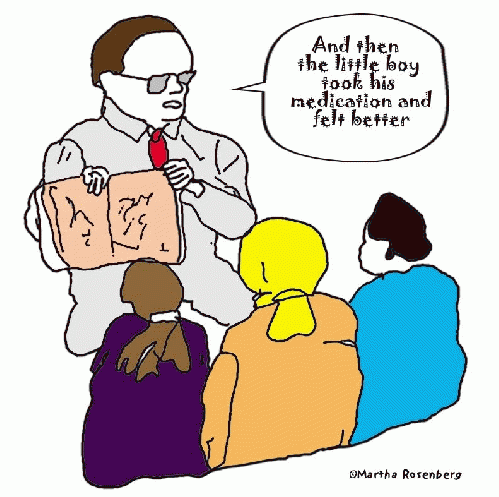by Martha Rosenberg and Evelyn Pringle
It's happened to anyone who's attended an open-mike session at an FDA advisory committee hearing. A queue of "patients" materializes out of nowhere to testify, often in tears, about the crucial need for approval of a drug the public has often not even heard of. Sometimes the drug has not been approved by the FDA at all, but often it's just not been approved for the use the patients wants--so it's not reimbursable.
"When insurers balk at reimbursing patients for new
prescription medications, these groups typically swing into action, rallying
sufferers to appear before public and consumer panels, contact lawmakers, and
provide media outlets a human face to attach to a cause," writes Melissa
Healy of the Los
Angeles Times of the artificial grassroots groups, sometimes called
Astroturf.
Who are these "patient groups" with
Pharma agendas? They include the Depression and Bipolar Support Alliance, which
gets half its funding
from Pharma and the National Alliance on
Mental Illness (NAMI), which received $23
million in just two years from Pharma. Both were
investigated by Congress along with the Mental Health America, the National Alliance
for Research on Schizophrenia and Depression, Screening for Mental Health Inc,
Children and Adults with Attention Deficit/Hyperactivity Disorder, the National Center for Mental Checkups
at Columbia University (Teen Screen) and the Child & Adolescent Bipolar
Foundation.
In recent years, a front group called Active
Minds has also surfaced on college campuses to tap the lucrative college
"mental illness" market.
A lot of money is lost, say Pharma internal documents, when kids go to
college and go off the meds their parents and teachers insist they take.
Treating poor people who are on government health plans with expensive drugs is also part of Pharma's plan. "For years, the alliance [NAMI] has fought states' legislative efforts to limit doctors' freedom to prescribe drugs, no matter how expensive, to treat mental illness in patients who rely on government health care programs like Medicaid, says the New York Times . "Some of these medicines routinely top the list of the most expensive drugs that states buy for their poorest patients."
How expensive? The prices listed at DrugStore.com in June 2011 for
atypical antipsychotics, for 100 middle dose pills were: Abilify $1,644, Geodon
$958, Invega $1,789, Risperdal $953, Seroquel $2,000 and Zyprexa $1,680. The
prices for antidepressants at a middle dose for 90 pills were: Celexa $346,
Cymbalta $440, Effexor $238, Lexapro $313, Paxil $346, Pristiq $418, Prozac
$631, Wellbutrin $311 and Zoloft $381.
Prices for 90 or 100 anticonvulsants pills at a middle dose included
Depakote $190, Gabitril $595, Lyrica $282, Neurontin $405 and a walloping $895
for Topamax and $1,040 for Lamictal. (According to the American Enterprise
Institute, the government wasted $51 million buying
Lamictal in 2009 though a generic was available.)
(Note: You can view every article as one long page if you sign up as an Advocate Member, or higher).






